- Home
- Stacia Deutsch
Bell’s Breakthrough Page 5
Bell’s Breakthrough Read online
Page 5
Mr. Watson tightened the screws on his receiver. He put the cone back up to his ear.
Nothing.
We hurried back next door to see what Professor Bell was doing.
He was talking softly down into the cone. The needle was bobbing up and down at the bottom of the liquid. But it still wasn’t working.
His face was red. He was frustrated. I was worried he’d quit again.
We had to do something. Time was running out, and he hadn’t invented the telephone yet! “Jacob,” I said quickly. “You know how to make things work. Go help him.”
“I guess I could try,” Jacob agreed. But just as Jacob stepped closer to Alexander Graham Bell, the professor stood up. He turned to us, holding the cone filled with battery acid, and said, “Maybe I was wrong.” He began to move toward Jacob, but his foot got tangled up and he tripped.
Professor Bell tried to catch his balance. But it was too late. He crashed into the desk and tipped the cone over. Battery acid spilled all over Professor Bell’s legs.
We all turned and looked at Alexander Graham Bell’s wet pants. And his wet shoes.
He bent over his desk and picked up the fallen cone. There was a little bit of battery acid left in the bottom, barely enough liquid to cover the end of the needle. Alexander Graham Bell put the cone down on the desk.
He was going to need some serious help cleaning up the mess.
“Mr. Watson, come here, I want to see you!” Alexander Graham Bell said firmly.
And to our surprise, a happy shout came from next door. “We did it!” Mr. Watson screamed down the hall. “It works!” He came running into the room. “Professor Bell, I heard every word you said—distinctly!” Mr. Watson had heard Professor Bell’s call for help through the receiver he held to his ear.
Alexander Graham Bell and Mr. Watson were very happy. Jacob and Zack showed them how to do high fives. And some low fives too.
“Less liquid in the cone! That was the answer,” Professor Bell cheered. He turned to look at Jacob. “Thank you, Jacob.”
“I’m glad I could help,” Jacob said, reaching out to shake Professor Bell’s hand. “Wait a minute,” Jacob suddenly said, pulling back his hand. “Why are you thanking me?”
“I tripped on your shoelace, me boy,” Alexander Graham Bell said with a laugh. “It was a good thing you didn’t tie it.”
“But I did!” Jacob shouted. “I tied it just before we did the T.T. to come back here.”
“T.T.?” Alexander Graham Bell asked with a curious look on his face.
“Time travel,” Zack translated. We all looked down. Jacob’s shoelace was wrapped in a neat bow.
“But if Jacob didn’t make Professor Bell fall, what happened?” I wondered aloud.
Alexander Graham Bell choked on a short spurt of laughter. He gave Jacob a hearty pat on the back and began to chuckle even harder. “You are correct,” he said, and pointed down. “It was me own silly lace that did the trick!”
I looked at his shoe and then up at Alexander Graham Bell. “You fell over your own untied shoelace!” I exclaimed in surprise. I was about to say something else about shoelaces, when suddenly, a loud beeping sound came from Jacob’s pocket.
The computer was warning us that we had only thirty seconds left. It was time for us to go.
“Good luck with the electric speech apparatus,” I quickly said instead.
“You mean the ‘telephone,’ ” Professor Bell said, and winked.
We said good-bye. Then Jacob held up the computer and pulled out the cartridge. The green hole opened near Professor Bell’s desk.
“What is that?” Mr. Watson asked. He stepped close to the hole.
Alexander Graham Bell pulled him back by the arm. “Do not go too close,” he said to Mr. Watson, grinning. “I will explain it to you later. Right now, we have to get back to our electric speech apparatus. We have much work to do before people can call 9-1-1.” Professor Bell winked at us.
Zack and Bo jumped first.
Jacob and I were ready to jump when we heard Professor Bell call after us, “Jacob, your shoe is untied again. You should tie it.”
“I’ll tie mine if you tie yours,” Jacob answered him with a smile.
Just as our feet hit the hole, I heard Professor Bell whoop with laughter.
Home Again
“Two hours, zero seconds,” Jacob announced. We were back at school. We landed outside near the playground.
“We did it!” Bo did a little happy dance.
“We fixed history!” I joined Bo in the dance.
Zack gave high fives to everyone. “I knew we could do it!”
“You’re kidding, right?” Jacob said to Zack.
“I said it wasn’t going to be easy,” Zack said. “I never said it was impossible.”
“Well, if Professor Bell can go back to the telephone, maybe someday you’ll go back to Theater Club or Science Club.”
“Maybe,” Zack answered, rubbing his chin like Bo always did. “You never know.”
“Come on. Let’s go tell Mr. Caruthers what happened,” I suggested.
We found Mr. Caruthers back in the library.
“We’re back,” Jacob told him.
Mr. Caruthers was sitting on the couch looking at his own copy of the book Famous People in American History.
He held up the book and smiled. “Shall we see how you did?”
“We—,” Bo began.
Mr. Caruthers put a finger over his lips. “Shh. Don’t tell me.” He handed me the book. “If history has changed, Alexander Graham Bell’s telephone won’t be in this book anymore.”
I read the chapter title out loud: “ ‘Alexander Graham Bell and His Many Inventions.’ ”
Mr. Caruthers told me to turn to page 56.
I flipped through the pages. There it was. A picture of the electric speech apparatus.
I pointed at the picture. There was the cone with the battery acid. And the screws where Alexander Graham Bell attached the wire that we had hung with Mr. Watson.
Under the photo was a painting of the boardinghouse room. Mr. Watson and Professor Bell were standing in the room. The electric speech apparatus was on the desk. And on the wall was the snowy owl portrait Mabel had made. I turned the book to show the boys.
“Good job,” Mr. Caruthers said. “Did you know that there was another man trying to invent the telephone at the same time as Alexander Graham Bell?”
Bo answered softly. We all leaned in to hear him. “Do you mean Elisha Gray?”
“Yes,” Mr. Caruthers said. “Elisha Gray was very close to inventing a telephone when Alexander Graham Bell finished his. Some people still think that Alexander Graham Bell stole the idea for using battery acid in the cone from Elisha Gray.”
“Why do they think that?” I asked.
“Well,” Mr. Caruthers explained, “in all the papers that Alexander Graham Bell wrote about inventing the telephone, he never mentioned using a liquid. In fact, he never tried using battery acid until March 10, 1876.”
Bo knew the rest. “I read that Elisha Gray’s notes all mentioned using a liquid, like battery acid, to conduct the electricity.”
“Right,” Mr. Caruthers told Bo.
I thought about that. Could Alexander Graham Bell have stolen the idea for battery acid from Elisha Gray? No way. I knew he got the idea from looking inside Firefighter Osborn’s fire truck!
“The other thing,” Mr. Caruthers added, “is that no one knows for sure if the story of the first telephone call is true or not.”
“The story?” Zack asked. “What story?”
Mr. Caruthers looked at Zack strangely before explaining. “The myth is that Professor Bell spilled battery acid on his pants and called for Mr. Watson’s help. But no one knows if it’s true.”
I thought about that one too.
It was funny. You can be there. You can see history happen. You can be part of a historic event. But more than 127 years later, no one is sure what really happened
.
They are just glad that it did.
And like everyone else, we were glad Professor Alexander Graham Bell hadn’t quit.
A honking horn made us look out the library window.
“Gotta go,” Jacob said. “Mom’s here.”
“Is baby Gabe with her?” I loved Zack and Jacob’s baby brother. Gabe was almost two years old, but everyone still called him “baby Gabe.” He was really cute.
“I think she brought him. She usually does,” Zack said. “Do you and Bo want a ride home?”
Bo had his bike at school, so he didn’t need a ride.
“No thanks,” I said. “I’ll walk.” I wanted some more time alone to think about Alexander Graham Bell and how his invention changed the world.
Mr. C pulled a little notebook out of his pocket. I had seen that notebook before. It was his list of famous Americans throughout history. We didn’t know why, but for some strange reason, all the people on Mr. C’s list were quitting. He flipped through a few pages, running his finger down the list of names.
Suddenly his finger stopped, and he pressed his lips together. “Hmm,” he hummed with a long breath. “It looks like I’ll need you kids again next Monday. Let’s meet in the classroom after school.” Mr. Caruthers waved to us as we left the library.
I couldn’t stop smiling the whole way home.
Next Monday we would have another adventure. We would go back in history to convince someone else not to quit and give up a dream.
I could hardly wait.
A Letter to Our Readers
Hi! We hope you enjoyed Blast to the Past: Bell’s Breakthrough.
Bell’s Breakthrough is a mixture of fiction and history. The time-travel part is fiction. No one we know has really time-traveled—at least not yet. But the story of Alexander Graham Bell and the invention of the telephone is true . . . well, mostly true.
Because his mother was deaf, Alexander Graham Bell was interested in sound and why some people heard sounds while others could not. He spent his life teaching deaf students and their teachers. His wife, Mable Hubbard, was also deaf.
When Alexander Graham Bell first had the idea for the telephone, he knew a lot about ears and sound vibrations, but he didn’t know anything about electronics. Or how to pay for his inventions. Luckily, Alexander Graham Bell had friends to help him.
Thomas A. Watson was the machinist who helped Alexander Graham Bell make an electric circuit. Mable’s father, Gardiner Greene Hubbard, raised money for some of Alexander Graham Bell’s inventions. And Mable helped “Aleck” by supporting him and encouraging his dreams. She painted the famous portrait of Alexander Graham Bell as a snowy owl.
As far as we know, Alexander Graham Bell never really quit. Even though he was a tinkerer and worked on a lot of different inventions, he spent a lot of time and energy inventing the telephone. He thought it would help make the lives of deaf people easier. But instead, the telephone has made life better for everyone!
It is true that a big fire destroyed much of Boston three years before Alexander Graham Bell invented the telephone. We think he would have liked learning about the 9-1-1 telephone system and how his invention saves lives.
The last bit of the story, where Alexander Graham Bell spilled battery acid on his legs and Thomas Watson heard him calling, well, no one knows for sure if that is a true story or a myth. It is up to you to decide. And while you are deciding things, no one will ever know if Alexander Graham Bell got the idea for using battery acid from Elisha Gray or not. Until someone really does invent a time-travel machine, there are a lot of questions about Alexander Graham Bell and the invention of the telephone that remain unanswered.
If you want to learn more about the series or want to contact us, you can visit our website at www.BlastToThePastBooks.com.
Enjoy!
Stacia and Rhody
BLAST TO THE PAST in the next adventure:
#4 King’s Courage
We were about to slip the cartridge into the back of the time-travel computer. Suddenly the classroom door swung open.
Jacob shoved the computer behind his back at sonic speed. I swear I heard a popping noise when his elbow broke the sound barrier. That’s how fast he moved.
“Jacob and Zack, are you in here?” Mrs. Osborn asked as she walked into the room. She was carrying their sleeping brother, Gabe, in her arms.
“Oh, good,” Mrs. Osborn said to her twin sons. “I found you. I need you to watch—” She paused when she saw me standing there. “Hi, Abigail,” she said.
I’ve always liked Mrs. Osborn. Jacob and Zack live next door to me. We’ve known one another forever. I hang out at their house almost as often as at my own.
“Hey, Mrs. Osborn.” I greeted her with a casual nod of my head. I’m good at looking like nothing’s up, when something really is.
Mrs. Osborn smiled at me and turned to look at Bo. “I don’t know you,” she said to him. “What’s your name?”
Bo’s real name is Roberto Rodriguez. He’s the new kid at school. I like Bo. He’s super-smart. He reads a lot and remembers everything. But Bo is also really shy, especially around adults. I figured I’d better help him out.
“This is our friend Bo,” I told Mrs. Osborn.
“Hullo,” Bo mumbled, staring down at his shoelaces.
She tried asking Bo a few questions about his family and how he liked our school, but his answers were all one word. “Fine” or “Good.” Stuff like that.
“You do it, Abigail,” Bo leaned over and whispered. “Tell her about me.”
“Bo’s an only child who lives with his mom,” I informed her. “Once he gets to know you, he talks more.”
Mrs. Osborn thanked me for the information. Then she took a long, careful look around the classroom.
There we were: four third graders all alone in room 305. No teacher. Backpacks neatly stacked in the corner. And Jacob, standing like a statue, with his hands held tightly behind his back.
If I were Mrs. Osborn, I’d be looking at us carefully too.
“I thought you had History Club with Mr. Caruthers after school on Mondays. Where is he?” Mrs. Osborn asked us, squinting her eyes slightly with curiosity. “What are you kids up to?”
“Nothing,” Jacob answered a little too quickly.
“This is our History Club meeting,” Zack explained. Zack wasn’t lying. Bo, Jacob, Zack, and I liked to call our time-travel adventures “History Club.” During History Club our teacher, Mr. Caruthers, sends us on missions to visit famous people in American history.
Mr. C had invented a time-travel computer. The computer looked like a handheld video game with four red buttons and a large screen. Slipping a cartridge into the back took us to the past. Pulling out the cartridge brought us home again.
Our teacher had told us that American history was in danger. He’d showed us a little black book full of names. For some mysterious reason all the famous Americans in Mr. C’s book were quitting. They weren’t inventing, or speaking out, or fighting for what was right. They were giving up on their dreams!
Mr. C wanted more time to focus on his newest invention, so he asked the four of us to time-travel for him.
It was our job to prevent history from changing forever!
So far we’d been very successful on all our adventures. We’d managed to keep history on track—no small thing since the computer gave us only two hours to get the job done.
Seriously, if Mrs. Osborn had walked into the classroom two seconds later, there would have been a green glowing hole in the middle of the floor. All she would have seen were the tops of our heads as we jumped down through time.
“Who’s going to tell me what’s going on here?” Mrs. Osborn asked as she looked at each of us in turn.
First, she stared long and hard at her two sons.
The twins might have looked alike but they were very different. It was easy to tell them apart. Today Jacob was wearing slacks, a white collared shirt, and a belt.
Zack wa
s the opposite. Jeans, T-shirt with a big food stain on the front, and tennis shoes so dirty they looked like they’d been run over by a garbage truck.
Their clothes were different and their personalities were different too. Zack worried a lot and quit everything he tried. And yet, he was also totally goofy and very funny. Jacob was more easygoing and adventurous. He never quit since he did only one thing—computers.
Their mom pinned her gaze on Jacob, who still had his hands locked around the computer, safely hidden behind his back. Afterward, she studied Zack. Zack’s lips were pressed so tightly together, they didn’t even look like lips. They looked like two flat pink worms. The twins weren’t talking.
Next, she looked at Bo, but saying “Hullo” had been hard enough for him. It was obvious he wasn’t telling her anything more.
So she turned to me. “Abigail?” Mrs. Osborn was looking for the truth.
I felt a teeny-weeny bit guilty that we were hiding something from her. “It’s—It’s just History Club,” I stammered. “Really.”
I think she believed me.
“Mom,” Zack asked as he moved to the side, away from Jacob and the computer, “what are you doing here?”
I guess I really had convinced her nothing unusual was going on, because Mrs. Osborn stopped surveying us suspiciously and answered, “Well, tomorrow is Election Day.”
Election Day is a special Tuesday in early November when people can vote for government officials and new laws. I knew that our school was a polling place—a place to vote. Last year my own parents voted in our gym during their lunchtime.
“I’m in charge of organizing the volunteers this year. We have a lot of volunteers coming to help out.” As Mrs. Osborn spoke, she shifted Baby Gabe up and rested him against her shoulder.
Even though Gabe was almost two years old, I still called him “Baby Gabe.”
Honestly, Baby Gabe was a destructive mini-monster. Nothing was safe if Gabe was around. But he was also super-adorable. Today he was wearing the sweetest little outfit: blue pants and a bright red T-shirt.

 Washington’s War
Washington’s War The Friendship Code #1
The Friendship Code #1 Spirit Riding Free: PALs Forever
Spirit Riding Free: PALs Forever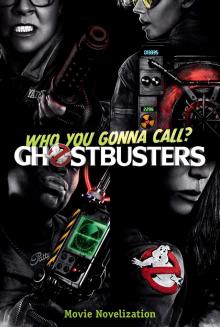 Ghostbusters Movie Novelization
Ghostbusters Movie Novelization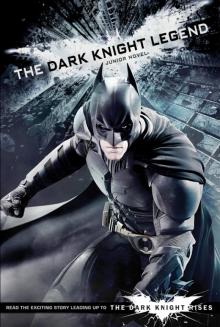 The Dark Knight Legend
The Dark Knight Legend Cinnamon Bun Besties
Cinnamon Bun Besties Spirit Riding Free: Abigail's Diary
Spirit Riding Free: Abigail's Diary Spirit Riding Free--Pru's Diary
Spirit Riding Free--Pru's Diary Diary of an Evil Queen
Diary of an Evil Queen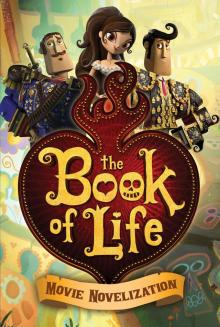 The Book of Life Movie Novelization
The Book of Life Movie Novelization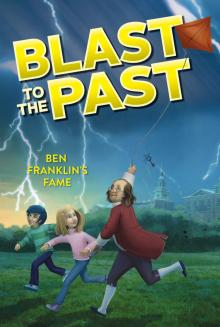 Ben Franklin’s Fame
Ben Franklin’s Fame The Dragon Queen
The Dragon Queen Sacagawea's Strength
Sacagawea's Strength Team BFF--Race to the Finish! #2
Team BFF--Race to the Finish! #2 Spirit Riding Free: Lucky's Diary
Spirit Riding Free: Lucky's Diary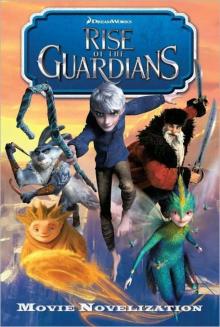 Rise of the Guardians Movie Novelization
Rise of the Guardians Movie Novelization Dragon Games
Dragon Games In the Stars
In the Stars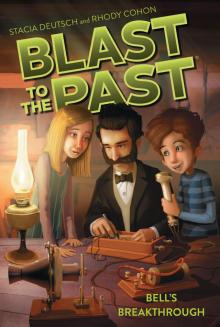 Bell’s Breakthrough
Bell’s Breakthrough